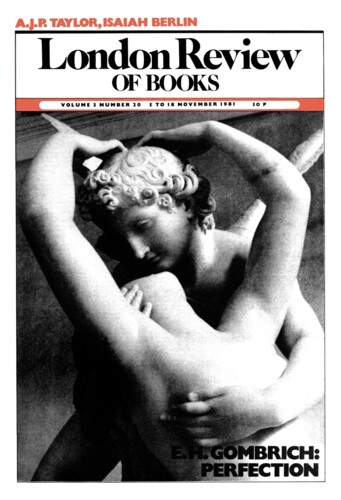Tribute to Trevor-Roper
A.J.P. Taylor, 5 November 1981
The festschrift, a collection of essays in honour of a senior professor, used to be dismissed as a rather tiresome German habit. Now, I think, it has become embedded in English academic procedure. A festschrift is a gratifying compilation to receive and sets an interesting task for the contributor. But it is the most difficult type of book to review. Where is the underlying theme, the spirit that holds together, in this case, 24 historical essays ranging from the question of who, if anyone, wrote the poems attributed to Homer to the imperialism and bellicosity of Great Britain before the First World War? I contemplated this problem gloomily for a long time and then stumbled on the answer.



